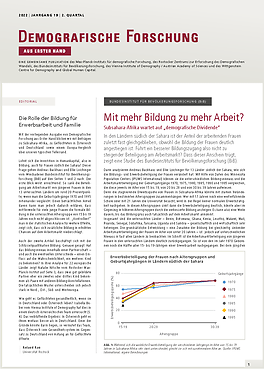July 04, 2022 | Defo News
How Education Affects Family Size

© MPIDR
The new issue (No. 2/2022) of Demografische Forschung Aus Erster Hand, the popular science newsletter with latest research results from demography, has been released.
The Newsletter is available in German only.
"Demografische Forschung Aus Erster Hand" is a joint publication of the Max Planck Institute for demographic Research (MPIDR), the Rostocker Zentrum zur Erforschung des Demografischen Wandels (RZ), the Vienna Institute of Demography (VID), the Wittgenstein Centre for Demography and Global Human Capital and the Federal Institute for Population Research (BiB).
The topics of the new issue are:
1. More Formal Education, More Work?
Sub-Saharan Africa Still Awaiting Demographic Dividend
(Federal Institute for Population Research)
In sub-Saharan countries, the share of working women has remained nearly constant, though the formal education of women has increased markedly. Is it that better access to education does not lead to increased participation in the labor market after all? A study by the Federal Institute for Population Research (BiB) shows that appearances are deceptive.
2. How Education Affects Family Size
Couples: A Parent with a Low Level of Education? Family Size Often Remains Smaller than with Highly Educated Pairs
(Max Planck Institute for Demographic Research)
Siblings are born less often in couples with not less than one low-educated parent compared to couples where both parents have a technical college or university degree. This is the result of a study by the Max Planck Institute for Demographic Research, based on a data analysis of 22 European countries.
3. Refugees and Health
Refugees in Austria Rate Their Health Better than Those in Germany
(Vienna Institute of Demography)
Refugees and asylum seekers living in Germany only have limited access to health services, and this for up to a year and a half. In Austria, by contrast, the healthcare system is open to migrants right from the start. The share of refugees in Austria who reported good health was twelve percentage points higher than in Germany.
The newsletter is released four times a year and is available electronically and as a printed version and is free of charge.
All past issues are available online on the Newsletter website. On the website you also have the possibility to subscribe to the Newsletter to get informed about the release of the new issues or to receive the printed versions by mail.